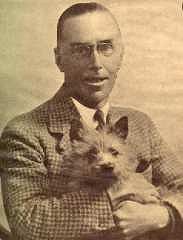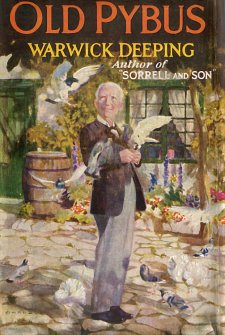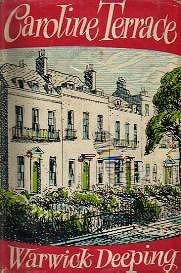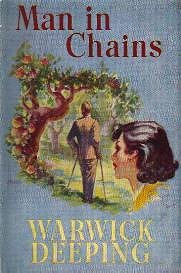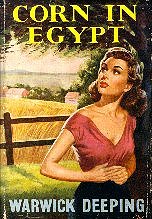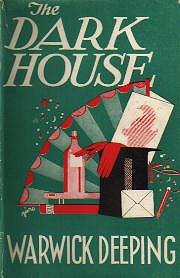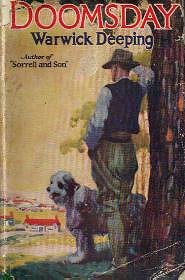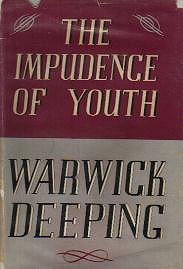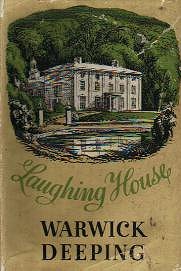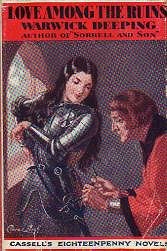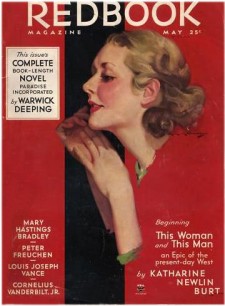| bc |
George
Davidson 'Warwick' Deeping, the Master of the early 20th
Century Romance, Eastlands, Weybridge, Surrey,
England, United Kingdom
NEW! The
Lost Stories Of Warwick Deeping -Volumes I, 2 and 3 are
available from Amazon.
Volume 1 Review
It took me a few months to read this mighty volume of 567
pages. The final 3 pages include details of where and when
each of the 42 short stories were published. The author tested
out plot lines and characters in some of these stories that
would later be used in novels. Whether your interest is in
historical fiction set prior to the Great War or later, you'll
find much enjoyment and pleasure in this fine collection. I
can thoroughly recommend it, not only to fans, but to all
discerning readers. John; July, 2014. |
George
Davidson Deeping was a doctor and the son of a
doctor, so it came as no surprise when Warwick went on to
study medicine at Trinity College, Cambridge, after
having been schooled at Merchant Taylor's and later by
tutor. In 1898 he obtained both his Bachelors of Medicine
and Arts, adding a Master of Arts four years later before
spending his formative years in London's Middlesex
Hospital. He left a fully qualified doctor, having only
toyed with writing poetry. Writing as a full time
occupation wasn't far away as he soon felt the need to
write an historical romance, a genre which was in vogue
towards the end of the nineteenth century.
So successful was
Warwick that doctoring was cast aside: he began to write
full time. He and his wife, Maude, moved to a small
country property in the county of Sussex where an
interest in designing gardens also blossomed into a
successful venture. The happy couple eventually
constructed their own house and this experience would
serve Warwick well in the plots of his future novels.
With the arrival of the Great War, Warwick once again
took up the mantle of doctoring: he spent four years in
the Army Medical Corps, serving in Belgium, Egypt, France
and Gallipoli. His experiences during those horrific
years changed his views on life. From now on he would
write contemporary novels around people he had met and
would go on to meet throughout the rest of his life,
which ended at the age of 72 on April 20, 1950.
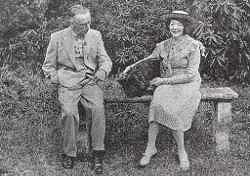
These
two photos of Warwick (and Maude, above)
were taken at Eastlands during the 1930s.
|
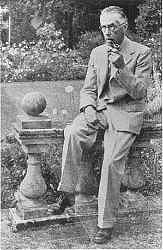
|
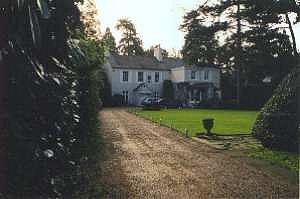
|

|
Eastlands,
Weybridge, Surrey, England, Warwick Deeping's
home. "As you leave the front gates and walk
along the curved, gravelled drive, through trees
and scrubs, you come to the front garden and see
this front view of the house."
Photo:
Geoff Towne, February, 1999. Note: this house is
NOT open to the public so please do not trespass!
|
Woking
Crematorium, Woking: the Remembrance Gardens
where Warwick Deeping's ashes were scattered.
"Note the spring flowers and seats for
meditation."
Photo:
Geoff Towne, February, 1999
|
Although
Warwick Deeping disliked being interviewed and attending
official functions connected with his writing, he did
write an illuminating entry for the 1942 edition of
'Twentieth Century Authors'. His appeal to several
generations of readers can perhaps be summed up in the
following: "...One set out to see life and
its realities, its pathos and heroism, and I have managed
to find it more splendid than sordid. A negative cynicism
seems to me to be a form of cowardice."
Useful REFERENCES
'Dictionary
of Literary Biography: Vol.1'
'Twentieth Century Authors' by Kunitz & Haycraft, W
Wilson, NY 1942
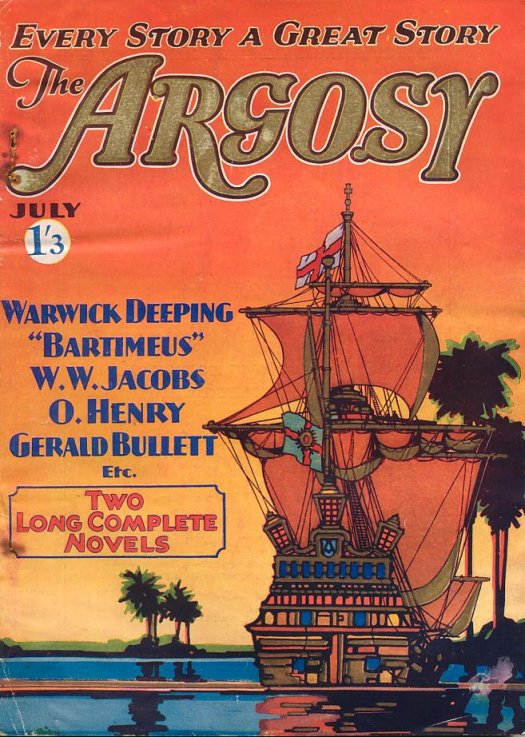 |
bc |
The ARGOSY
Warwick Deeping was a regular contributor to the US pulp
magazine, The ARGOSY during the interwar years.
July 1931 (left) contained a
SULVA JOHN piece.
September 1933 (right) SIX MONTHS TO LIVE, bi-lined as
"Great Human Problem Stories 2". |
bc |
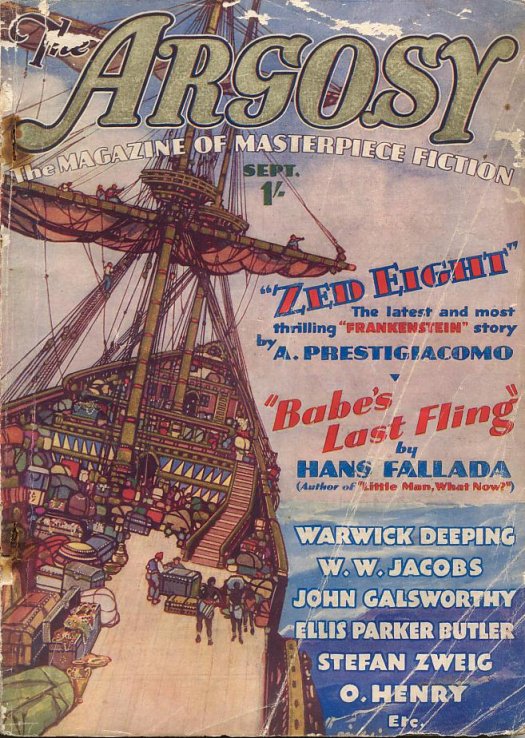 |

|
Warwick Deeping's most
popular novel was SORRELL AND SON. This
monumental work made his name a household word
not long after publication and went through
countless reprints. First published in 1926, Pan
brought out this paperback edition in 1956.
Penguin followed suit with a TV tie-in 20 or so
years later.
The
dedication by the author in this book:
'To the memory of my father'.
|
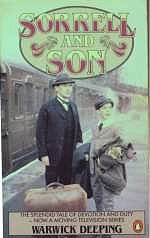
|
The
WARWICK DEEPING APPRECIATION SOCIETY is no longer in operation as Geoffrey
Gillam sadly passed away in 2008. If anyone else takes
over the society's operations, I'll post the details
here. Thanks to Andrew for updating me on this matter. John
Geoffrey reported that while visiting Southend, he
discovered that it was the setting for SLADE and MR
GURNEY AND MR SLADE. "One could take the book and
follow the story from street to street and in most cases
from building to building."
"The same sort of thing happened when I had to go to
Islington... Having read OLD WINE AND NEW and being a
little early I turned left, instead of right, at Essex
Road station and walked to Canonbury Square, passing on
the way various places mentioned in the book."
WARWICK
DEEPING'S NOVELS, all published in the UK by
Cassell.
|
List in alphabetical
order ignoring 'A' or 'The' [LINKED to reviews]
Note: Meryll Williams and Gary Rohrer have kindly
provided details of alternative titles for certain books.
D M Young also noted a couple of omissions. Thanks for
your interest. Where I've sighted a book, I've treated it
as the 'known' title. If you come across books
with the alternative title, please
forward details as to publisher and
date published.
APPLES
OF GOLD, 1923+
BERTRAND OF BRITTANY,
1908
BESS OF THE WOODS, 1906+
BLIND MAN'S YEAR +
CAROLINE TERRACE +
CORN IN EGYPT +
COUNTESS GLIKA & other
Stories +
DARK HOUSE , THE +
DOOMSDAY +
EXILES, 1930+
FANTASIA +, aka 'Blue
Water'
FOLLY ISLAND, aka 'Shabby Summer'
FOX FARM, 1911+, aka 'The Eyes
of Love'
HOUSE OF ADVENTURE, THE, 1921
HOUSE OF SPIES, THE, 1913
I LIVE AGAIN +
IMPUDENCE OF YOUTH, THE
+
JOAN OF THE TOWER, 1911
KITTY + 2
reviews
LAME ENGLISHMAN, THE, 1910+
LANTERN LANE, 1921
LAUGHING HOUSE +
LOVE AMONG THE RUINS, 1904
MAD BARBARA, 1908+, aka
'These White Hands'
MALICE OF MEN +
MAN IN CHAINS +
MAN ON THE WHITE HORSE, THE
MAN WHO WENT BACK, THE
MARRIAGE BY CONQUEST +
MARTIN VALLIANT, 1917
MR GURNEY AND MR SLADE, aka
'The Cleric's Secret' +
NO HERO, THIS + 1936
review
OLD MISCHIEF
OLD PYBUS, 1928
OLD WINE AND NEW +
OLD WORLD DIES, THE +
ORCHARDS,1922, aka 'The Captive Wife' +
PARADISE PLACE
PORTRAIT OF A PLAYBOY +
PRIDE OF EVE, THE + |
PROPHETIC MARRIAGE,
THE, 1920
RED SAINT, THE, 1909
REPRIEVE +
RETURN OF THE PETTICOAT, THE
ROAD, THE + +, aka 'The Ten
Commandments'
ROPER'S ROW +
RUST OF ROME, THE +
SACKCLOTH INTO SILK,+ aka
'The Golden Cord'
SECOND YOUTH +, [aka 'The
Awakening'
SECRET SANCTUARY, THE,
SERPENT'S TOOTH, THE
SEVEN MEN CAME BACK.+
SEVEN STREAMS, THE, 1905
SHABBY SUMMER
SHIELD OF LOVE, THE, 1914, aka 'The King Behind
the King'
SHORT STORIES OF W D, THE See SHORT STORIES
SINCERITY, 1912, aka 'The Challenge of Love' aka
'The Strong Hand'
SLADE +
SLANDERERS, THE
SMITH +
SORRELL AND SON, 1925*
STORIES OF LOVE, COURAGE AND COMPASSION
SUVLA JOHN + Also appeared
in THE ARGOSY, July, 1931
SWORD AND THE CROSS, THE +
THREE ROOMS +
THREE STORIES OF ROMANCE contains 'Martyrdom'
TIME TO HEAL
TWO BLACK SHEEP
TWO IN A TRAIN, AND OTHER STORIES
UNREST, aka 'The Bridge of Desire'
UTHER AND IGRAINE
VALOUR +
WHITE GATE, THE
WOMAN AT THE DOOR, THE +
WOMAN'S WAR, A
*SORRELL & Son.
Mention in CD 448 (4/1984) of a movie starring H
B Warner , seen in April 1934.
Note - 'These White Hands' may be an alternative
title so I've not included it above. |
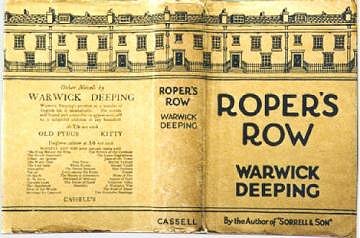
MAGAZINE CONTRIBUTIONS
See the Christmas
number of 'Good Housekeeping', 1930, which contains
"Making the Best of Life', in which WD maintains
that "to get the best out of life one must begin
with some sort of purpose. We must begin by wanting
something that is worthwhile, and by setting ourselves
passionately and stoutly to possess it."
MOVIE
TIE-INS
* There was a silent film of SORRELL AND SON produced
by United Artists starring H B Warner, and a 1933 sound
version (also with H B Warner). The only way to see these
films at the moment is at the BFI. (British Film
Institute.) The BFI also holds films of FOX FARM
1922 and KITTY 1929.
* Meryll W recently advised that a
version of DOOMSDAY was also filmed, by
Paramount in 1928. Production Credits: Director and
Producer Rowland V. Lee; Scenarist Donald W. Lee;
Adaptation Doris Anderson ; Photographer Henry Gerrard;
Editor Robert Bassler; Titler Julian Johnson. Cast: Mary
Viner Florence Vidor; Arnold Furze Gary
Cooper; Percival Fream Lawrence Grant;
Captain Hesketh Viner Charles A. Stevenson.
There's a 2-page spread with photos in Homer Dickens'
'The Complete Films of Gary Cooper' (Citadel 1970/1991).
* From inthetwilightzone@gmail.com [TWO] BLACK SHEEP
was made into a 1930s movie called Two Sinners. Ending
apparently a bit different than the book. One of the
first releases of newly-formed Republic Pictures, Two
Sinners was adapted from The Black Sheep, a serialized
magazine story by Warwick Deeping. Otto Kruger stars as
Henry Vane, who uncomplainingly serves a lengthy prison
term for shooting the cad who compromised Vane's wife.
Hoping to leave his past behind him, Vane falls in love
with Elsie Summerstone (Martha Sleeper), the governess
for bratty Sally Pym (Cora SueCollins). Thanks to the
infidelities of Sally's mother (Minna Gombell), Vane is
unable to stay out of trouble for long. In true
"Shirley Temple" fashion, it is up to little
Sally to straighten out the storyline. ~ Hal Erickson,
All Movie Guide "
TRIVIA
Many thanks to those
of you who've added to this list.
From: jmackenzie48@yahoo.com
You may already know about this but whilst I was trawling
the web looking for references to the author David Divine
I came across a website about the historian Liddell Hart.
I scrolled down looking at the correspondence records and
discovered an entry about Warwick Deeping and a reference
to an obituary. It's at http://www.kcl.ac.uk/lhcma/cats/liddell/li01df.htm
From
a reader.
"While reading a novel, The Information by
Martin Amis, I noticed that Deeping was mentioned in
passing..."
From rainyday@bigpond.net.au
I have recently obtained a book called The imaginary
eye-witness. Edited by C H Lockitt, Longmans, Green
and Co, 1937. It has 17 excerpts by various writers
including Warwick Deeping. His story is called Rome
again AD1849. I have also got a magazine called
The Storyteller (Canadian, I think) that has a short
story called The pool of the satyr. These may be
out of books or have been originally printed in short
story volumes, but they may be new. I also have another
short story called A Christmas Victory in The Fireside
Omnibus by Hutchinson, no date.
From
John N
In Sebastian Faulks' novel Charlotte Gray - on
page 68 the hero notes:
" ... a shelf packed with the novels of Warwick
Deeping and Hugh Walpole".
In Bill Bryson's Neither here nor There - his
essay on Paris refers to Shakespeare & Co on the Left
Bank:
" full of ... and old forgotten novels by writers
like Warwick Deeping".
Since I have for many years been the owner of Warwick
Deeping's house in Weybridge, I asked Bill Bryson how he
picked on Deeping's name. He said his grandmother had a
shelf full of his books and he remembered " ...
being oddly attracted to that melodic name from an early
age".
BOOK REVIEWS
(From May, 1998 onwards, book
reviews are dated.)
Ratings and short synopses follow, in alphabetical order,
ignoring 'A' or 'The'.
Ratings will vary from *average to ***exceptional. If you
would like to express an opinion on any of WD's books, or
take me to task on my ratings, please write in. These short
reviews won't spoil any plots and the ratings are purely
personal.
APPLES OF
GOLD
(1923)
Tom Nando is a fencing instructor in 19th century London.
He and his wife Mary are given an unwanted child who
becomes Jordan, their much-loved son. This books takes
the reader through Jordan's life, his sexual awakening
and subsequent entanglements, both with women and the
Whigs at Ludgate Hill and Fleet Street. This was my
first foray into WD's historical romances. With two dozen
WD novels on my shelves, I made the possibly silly
decision to read them in alphabetical order! It took a
couple of chapters before I was hooked. **
BERTRAND OF
BRITTANY (1911) Reviewed
November, 2000
This romance is set during the Fourteenth Century and
concerns the awkward and unloved son of a well to do
family who falls in love with an eight year old child who
displays a kindness towards him. One could descibe it as
a 'fine love', a term probably not understood these days.
Bertrand sets out to prove himself but it will be many
years later before the two meet up again in rather more
dire circumstances. An example of the author's
unrivalled attention to detail, the reader soon becomeing
enveloped in the past as it is written. **
BESS OF
THE WOODS (1911) Reviewed
February, 2001
Another romance, set this
time in the Eighteenth Century. A rich young Richard
Jeffray appears destined to marry a local woman of the
world but he will spot a lovely Bess of the Woods who
will change his way of life. If I'd read this book
much earlier I'd have probably given up early on, tired
of the descriptive padding which must have bolstered the
page count by a hundred pages or more! Enjoyable in parts
but not worth even one star.
BLIND
MAN'S YEAR (1937) Reviewed
November, 1999
It's been many months
since I last read a WD novel, and I picked this on the
basis that it was the first title on the shelf to meet my
eye! A young man is on his way to interview famous
author Douglas Gerard. He really needs the interview as
his job on the paper is none too secure. Desperation sees
him leap the garden fence, only to be confronted by a
rather large Alsatian. He does obtain an interview of
sorts, though neither he nor Gerard come within sight of
each other. He does discover that Gerard is in fact a
woman. She lives a secluded life, being afflicted by a
facial birthmark. Not long after the reporter hurries off
with his scoop, a plane crashes nearby. The pilot seems
unlikely to survive. The plot of this book is
transparent from this point on, but as with many of WD's
novels, it is not the plot but the characters who are
important. Set in the south of England and later London,
it is what I term a 'traditional WD novel'. Lovers of the
English way of life, circa 1930, will lose themselves in
the book, as did I. Unusual for a WD book, there is at
least one loose end: the old neighbour in London who
wants to find out more about the couple next door. Some
of the dialogue is dated but it earns a *.
CAROLINE
TERRACE
(1955)
Isabella Luce, a young lovely of the Victorian era with a
dark secret, arrives in South End. She takes up residence
in room 13 of the Royal Hotel, by Caroline Terrace. This
stately street houses the pick of South End by the sea
society, with lesser mortals being housed in Caroline
Mews -"coarser in speech, prone to drunkenness and
brawling". Miss Luce, taken in hand by the eccentric
Miss Cripps, soon comes to the attention of the handsome
George Travers and the plain and clumsy parson, John
Jordan. These characters and a host of others are
woven together in a brilliant tapestry of intrigue and
adventure. WD's skill in plucking a group of humanity
from life and relating each of their stories in turn
produces a novel which simply can't be put down. One has
to keep reading in order to find out what happens next.
More often than not, it's not what one expects, that
happens! ***
CORN IN
EGYPT
(1941)
Grant Carey was a minor member of a firm of chartered
accountants when Aunt Jennifer departed this world,
leaving him a tidy sum of 5000 pounds. He moves out of
Chelsea and goes a tramping, looking for he knows not
what. Along the Pilgrim's Way, in a little valley below a
chalk ridge, he comes across a notice board proclaiming:
"Blackthorn Farm - For Sale". So he moves onto
this long abandoned farm, complete with a canvas bath and
bucket of water. Seasoned countryman and wanderer Will
Wightman soon stops in permanently as Grant's handyman
and one day a horrific car crash delivers them a
diminutive doggie, Prince Charlie, the only survivor. The
story moves along at a cracking pace as the trio attempt
to turn the farm into a paying proposition. The daughter
of the previous owner comes into the picture and you'll
discover exactly what it took to run a farm back in the
years after the Great War. This novel marked another
first in my reading of WD - it's told in the first
person, ostensibly from Grant Carey's diary. ***
COUNTESS GLIKA and
OTHER STORIES (1919) Reviewed March,
2006.
'Countess Glika' is but one story. Also contains 'The Red
Shirt', "The Girl on the Mountain', The Lady on the
Treeace' and 'Bitter Silence'. The first four are set
in Europe, are sentimental; syrupy, one could say. Even I
could not make it through 'Glika'. If you like olden
style love stories, you'll enjoy all but I had to throw
in my hand on these four. 'Bitter Silence', though, is
easily the pick of the crop. The shortest one here,
the experiences of an author who is the only means of
support of his extended family and for that reason risks
the white feather for failing to answer the call during
the Great War. I won't spoil it by teling you any more. So,
* for this book, that being for the latter story.
THE DARK
HOUSE (1941)
Senior staff at St Martha's Hospital in London believed
that Dr John Richmond would one day be a senior surgeon
with a five-figure income. Through a series of disastrous
events set in motion by his brother's poor investments,
Richmond finds it necessary to set up as a GP in
Southfleet, forty miles from the city. He joins a two-man
practice. Dr Richmond is the dour but fatherly senior
member, Dr Burgoyne the more colourful junior partner.
The practice is situated in Prospect House, noted for its
brass bell handle in the shape of a clenched fist. Dr
Richmond, the father of five un-married daughters, is
soon to retire. Conditions of Richmond's position
include: smoking in public is not permitted; he must not
be seen in a public house; he should not be seen out of
doors without a top hat; his language must be 'decorous';
no married woman patient could make love to him or be
made love to by him, and the "playing of cards or
billiards was not advisable". The story moves
along slowly but surely and the reader soon becomes lost
within the doings of Southport. WD once again sets his
story by the sea and brings forth another collection of
fascinating true to life characters. **
DOOMSDAY (1927)
Mary Viner was a domestic slave to her sickly but kind
parents. Arnold Furze had worked Doomsday Farm, Sussex,
120 acres, for five years, with the help of Will Blossom
and his boy. Bobbo the sheepdog and Tibby the black cat
were his companions. Furze supplies milk to the Viners
and is a man on the land. Mary longs for the pleasures of
the city, or at least the pleasures of life off the land
as portrayed to her by sister Clare, now residing in
London. Oh, to be up in the West End, under the lights!
To tell more of the story would spoil it for those
readers who haven't yet had the pleasure. This book is
split into three parts, which enabled me to spread the
reading over three days. WD deplored the move away from
the land, and never (not so far, at least) has he
portrayed the heroic farmer so well as he has in this
book. The critics at the time no doubt regarded this book
as overly romantic, old-fashioned, dated, but it's a
beautifully crafted story of a time long gone, when man
and woman made a success of life on the land - or
perished in the attempt. ***
EXILES (1930)
Barbara Irene Brown, 26, arrives at Julie Lord's English
Library and Tea Room in the Italian town of Tindaro. I
left this book at page 11, as there was something
jarring; perhaps it was the racist overtones. Not that
I'd criticise WD for that. After all, such views would
have been common in Britain at the time. Perhaps one day
I'll return to the story. If someone has read the book,
please send in a review.
FANTASIA (1939)
Poet John Skelton arrives in Switzerland on a tramping
holiday. He meets Ann Lester at the Hotel Schiller. That's
as far as I reached. This story is dated but similarly
with EXILES, I'll read it one day. A review would be
appreciated.
FOX
FARM
(1911)
Jesse and Kate Falcomer are a couple out of love. There
was love in the relationship - once - but it's long gone.
Although initially I thought this book would be a
replay of DOOMSDAY I couldn't have been further from the
truth. The harrowing tale which unfolds as the story
progresses had me entranced for hour after hour. To tell
more of the plot would spoil the surprise. ***
THE HOUSE OF ADVENTURE (1921) Reviewed
October, 2000
Set at the close of the Great War in France. A British
tommy swaps identities with a fallen comrade, sets up
house in a devastated French village and poses as a
Frenchman. The owner of the house falls in love with him
but there is a rather nasty local innkeeper who ferments
trouble. Highly sentimental and a little difficult to
swallow at times. Yet it contains the most horrifying
scenes of violence I've come across in a WD book. Well
written but recommended only to the seasoned WD admirer.
*
I LIVE
AGAIN (1942)
Reviewed November, 1999
Told in the first
person, this book is quite unlike any other WD novel I've
read. It covers several generations and can best be
described as the journey of the soul of a man as he is
reborn, with each successive rebirth giving him a greater
measure of wisdom. At the start he is a savage, although
with the beginnings of a conscience. It might be seen as
an explanation of the British way of life, as the
narrative towards the end comes to the then early days of
WW2. There is savagery and violence early on, to be
replaced by love and compassion as the book draws to a
close. So strongly does the story begin, it seems
inevitable that the impetus will be lost later on and
such proves to be the case. I'd be interested to read
your thoughts on this novel. **
THE IMPUDENCE OF
YOUTH
(1945)
John James is a lad like no other, at least in the
village. Miss Pope, his aunt and proprietor of the
general store/post office, dotes on this genius of a lad
who is afflicted with a growth deficiency which keeps his
legs to childlike proportions. John goes off to Cambridge
on a scholarship and is treated mercilessly by the other
young gentlemen. He is given the nickname 'Tadpole' and
finds another aspect of life in Germany. He wants to set
up a private laboratory and finds rooms in Unicorn Place
in the East End of London. Here he discovers life as it
is, or was, and eventually falls in love with Kitty. This
is a black story, WD's blast at the class system, those
who set out to destroy anyone who refuses to conform and
who dares to be different. His pen dipped in vitriol, the
author gives Society both barrels. Although many of his
books took swipes at the class system, this story may
come as a shock to new readers. **
KITTY (1927) Two
reviews.
Mrs Clara St.George is an
icy widow of London, a woman of affairs used to getting
her own way. Displays of emotion are both foreign and
repugnant to her. Alex, her only son, home from leave and
soon to face the war in the trenches, feels scared and
alone. In contrast, Mrs Sarah Greenwood, a doctor's widow
who keeps a tobacco shop near Piccadilly, is a cheerful
soul who shares life with daughters Coral and Kitty. Alex
will walk into her shop and come face to face with Kitty,
before going across the channel and returning home a
broken man. From there his life will become a tug of war
between his mother and Kitty. A really good story
which will show you what the seriously injured ex-soldier
was up against back in the days before modern medical
practices and attitudes helped to improve his chances of
a near as possible normal life. The battle of wits
between the mother and the lover will keep you reading
without a break. Well, it did me, anyway. One of the best
and well deserving of the rating. *** Reviewed
November, 1999
[Here's a review from a first time reader of WD; Megan
Lord, a member of the Abbey Girls of Australia]:
The writing is superb, the descriptions are detailed
and believable and you can see War time England from a
variety of places and peoples. I am enjoying the book but
it gripping me only to know how it will finish. There are
more than enough twits and turns. I had to not read a
couple of pages when Alex is recovering at his
mother’s house- so harrowing it was. His
characterisation is excellent. At no time are you in any
doubt about how he feels himself about these characters
he has created or drawn. I think that I would like to
read another but not straight away as they are really
quite emotional. I usually prefer women authors so this
has been a very good example of male writing for me. Not
always do I read women but mostly I would say. [Later] I
thought it ended in just the right spot except that I by
then I wanted to know more!!! July,
2008
THE LAME
ENGLISHMAN (1910) Reviewed
September, 2000
An historical romance set in
Italy, and in particular Rome, c1849 when Garibaldi was
fighting to unite Italy. Tom is the Englishman of the
title who, despite being physically challenged, throws in
his lot with the patriots as they fight to keep the
French and Austrians out of Rome. Through his dying
mentor he meets the beautiful but married Cesca. To tell
any more would spoil the story. Despite not being a
fan of historical romances, I thoroughly enjoyed this
book which, being one of the author's early novels, will
be too sentimental for many modern readers. **
LANTERN LANE (1921) Reviewed October,
2000
This novel is set during the reign of Charles the
Second, an often misunderstood king by all
accounts. John Fairfax finds himself acting as
the go-between for Charles and one of his many
loves, Barbara. The great plague plays a part in
John getting his life in order as he nurses one
of the greatest French fencing masters back to
health. Okay, I've admitted I'm not a fan of
historical romances. This book, however, kept me
turning pages for hours with hardly a break. I
expected the story to come laced with an excess
of sentimentality. 'The House of Adventure', my
next WD book, fell into that group. 'Lantern
Lane' is unexpectly lacking in the often
double-dose of the foregoing. It is brilliantly
written though of course this is as always a
personal view. So I'm giving it the order of the
box; the BEST so far, apart from 'Sorrell and
Son'. |
LAUGHING
HOUSE
(1946)
The story of a house, Beech Hill, built in the year of
Waterloo and soon to endure the rigours of the Second
World War. Occupied by various units through the
early years of the conflict, you'll lament its
deterioration at the hands of those with no appreciation
of beautiful things. A further story related in the first
person, a beautiful and wonderful story of survival. Told
by the owner of the house as he is forced to watch from
the sidelines. This is indeed a 'laughing house' as it
takes everything thrown at it. Although I've an
appreciation for fine architecture, I'm not one for
loving inanimate objects. A house is but a house. This
story really dragged me in. Possibly WD's best work set
in a modern period. ***
MAD
BARBARA
(1908) Reviewed
November, 2000
Barbara Purcell discovered her father, dead, a sword
through his heart. The only clue to his murderer is a
short chain of gold with a knot of pearls for a button,
seemingly torn from a man's coat. And so began
another historical novel, set in the decaying upper class
of England. What depths relatives will step to in the
pursuit of love and affection forms the backbone of this
story. Yet another good'un from the Master of
storytelling. **
THE MALICE OF
MEN
(1938)
Young John Keats Lancaster had a passion for lead
soldiers. His parents kept a draper's shop at Westend on
Sea. John and his mother moved to Sandbourn in Sussex
upon the death of his father, where she opened a lodging
house: no.42, Regal Terrace. The Old Town finished at the
Monument, a clock-topped pseudo-classic column which
"set a boundary between the rude toilers of the sea
and the segregated gentility of Sandbourn's
west-end". The ruling family further up one of the
valleys among the hills lived in Beaulieu Park, "a
serene and stately place that seemed to hang like Olympus
in a more majestic sky". And "Beaulieu belonged
to the Bullstrodes, and in Sandbourn the name of
Bullstrode was the sign and symbol of that other world
that lived aloof in a serene arrogance of its own".
And then came Sanchia Cherrill. This, again in the
first person, is the story of one boy/man's rise to
greater things. Brilliantly written with short, clipped
sentences while the narrator is still a boy, it takes on
a life of its own. Some may consider it a social document
on the birth of modern housing developments. I was
tempted to re-read it immediately! ***
MAN IN CHAINS (1953)
Jack Cobourn is an ex-fighter pilot who had the
misfortune to sustain a broken spine as the result of a
crash. A partially successful fusion means he can stand
for 20 minutes at a time. With the help of the devoted
help, he runs Rose Hill Cottage, their source of income
being derived from berry- growing. While he picks from
the lower branches in his chair, the others clear the
higher growth. Mary Marner is the dowdy but essential
office worker and Jill of all trades who dotes of Jack,
although he never realises it. Sanchia Craven of Hazeley
Manor is a high flier, a mover and shaker in the social
whirl, who comes to love Jack as well. You'd expect
this to lead to disaster. It does, but out of disaster
comes - what? You'll have to read this enjoyable book to
find out what. **
MARRIAGE BY
CONQUEST (1915) Reviewed October,
2005.
Naive book collector John Flambard returns from abroad to
his estate, Chevrons, in southern England. Nearby
neighbour and widow, Stella Shenstone, of Stonehill, is
courted by not-so-gentlemanly Sir Richard Heron. Flambard
is sound of mind and limb, ignorant in the ways of
womankind. The Lady will use him in her plans but fall in
love and suffer a guilty conscience. Heron will do
whatever it takes to rid himself of the new arrival and
conquer Stella. The story is set sometime after
Cromwell and is entertaining for the first half.
Sentimental wanderings and love-making slow things down
for about the next hundred pages before the story takes a
turn for the better. For WD fans only, unless you're a
fan of sentimental love stories! *
MR GURNEY AND
MR SLADE (AKA THE CLERIC'S SECRET) (1944)
Reviewed by inthetwilightzone@gmail.com (anonymous
coward656)
This story is a sequel to SLADE, but with only a
relatively minor appearance of James Slade. The story
centers around the new Cleric in Southfleet, Mr. Gurney,
who has a secret past, which when disclosed by the town
gossips, puts him at odds with all the parishioners at
St. Jude's church. Fortunately, Mr. Gurney is taken under
the protecting wing off an aging Mr. Slade so that he is
able to weather the immediate storm. To help put his past
behind him, and prove himself to Rose, the young divorcee
featured in SLADE, Mr. Gurney enlists as a padre in the
great war, and becomes a most unexpected hero with his
men. The story has the trademark Deeping scenes of the
carnage and harsh living conditions of life in the
trenches in France.
As in SLADE, Dr. Richmond and his family (Lucy and
Charlie) from THE DARK HOUSE, are also featured again in
this story.
328 Pages. Once you get over the disappointment of the
short appearance of James Slade, it's a worthy story in
its own right with the vivid descriptions of battle
scenes and a love story of a simple, sincere man and an
understanding woman. **
NO HERO-THIS (1936) Reviewed May, 1998 (See
Australian Woman's Weekly review here.)
Dr Stephen Brent, 35 and in partnership with 53 y.o. Dr
Randall, was not quite at ease. Even Stephen's wife,
Mary, seemed to be hiding her feelings of late. Their
little town of Brackenhurst, hidden away in a quiet
corner of Sussex, seemed offended by his non-appearance
in khakis. Like many other honourable men of the Great
War period, Stephen eventually found himself in uniform. His
adventures from Gallipoli to the hell hole of France, the
incompetence of the higher ranks, the horrors of trench
warfare and the closeness of friendships forged in blood
on the battlefields will move you like no other book on
the Great War. This novel seems semi-autobiographical, WD
having served in the Royal Army Medical Corps in all of
the locations mentioned in this book. To quote from the
rear jacket blurb of the first edition: "This is a
different novel to any other that has ever come from the
pen of Warwick Deeping. Some will say that it is the
finest novel that he has written, not even excluding
SORRELL AND SON. And perhaps they will be right. //Many
pens and able have written of the War, of every phase of
the War, until there seems nothing left in the War to
write about.// But strangely enough, no one has ever
written a novel about the life of a doctor in the War. It
has remained for Warwick Deeping to do this.// With his
deep human sympathy, his wide understanding of men and
women which has made his books so universally popular, it
was only to be expected that a subject like this would
bring a fine book from him. Deeping loved writing this
book because he felt every word he wrote.// It is a story
of heroism which has its mission for peace." Highly
recommended.***
OLD WINE AND NEW (1932) Reviewed September, 1998
Spenser Scarsdale serves as a medical orderly in France
during the Great War, just one of the faceless brown
crowd. Known as 'Hands' or 'Old Bossy' for his gentleness
of touch, Scarsdale is two men: the One who does and the
One who observes. One day he takes it upon himself to
visit the Front and comes across Marwood. The two
Londoners meet up again in the clearing station. Marwood
gives Scarsdale a package containing a photo of his
daughter and some letters, then dies. Scarsdale will
deliver the package and fall in love with the daughter,
but that will simply be the beginning of one part of his
life. It's been a while since I read a WD novel. This
could almost be a continuation of NO HERO-THIS, although
the characters are different men in many ways. Scarsdale
is a man with whom I can readily identify. A writer of no
great note who will find London life after war a world
apart. This is a long novel - almost 400 pages. I read it
in a little over a day of spare time. The narrative as
usual reaches out and grabs your heart. You're held in
the author's grip and must read on without a break until
hunger intervenes. Or so it was with I. How I marvel at
WD's ability with pen and ink, his mastery of the English
language, his knowledge of human nature! Yes, another
chance to lose yourself in post-WW1 London. You're there,
breathing the air and marveling at the sights. Technology
may advance but people change but little. This novel has
to rate ***.
OLD
WORLD DIES,
THE
(1954)
Reviewed October, 1998
Sir Roger Marrion lives at Wynyates, a large country
house at the foot of The Surrey Downs. With his world
fast disappearing and war clouds looming, Roger's best
years are behind him. His story begins in 1939 with
Britain unprepared for war. Roger takes heed of what lays
ahead and prepares his people and property despite his
own pessimism. The plot of this book is similar to the
earlier LAUGHING HOUSE, although it is presented as a
series of diary entries covering June 1939 to February
1942. In the pre-amble, Roger mentions that he has
survived four years of war. This seems to indicate that
the book is incomplete. At a little more than 150 pages,
having been published several years after the author's
death, this seems likely. See what you think. As such, I
found it to have a most disappointing conclusion. *
ORCHARDS
(1922) aka 'The Captive Wife' Reviewed
November, 2003
This is a fairly hard to find WD book; it's taken me 5
years to turn up a copy. A romance set in the 17th
Century during the civil war. British history prior to
the 20th Century has largely been forgotten by this
reviewer. Not unusually, the well-heeled hero has a limp,
falls in love with a rather wild lady with impeccable
credentials, plays the gentleman once too often and is
too good to be true most of the time, comes to his senses
and takes up the sword. As with all WD novels,
brilliantly written with amazing attention to detail,
worthy of a BBC mini-series and rollicking good fun. If
you've run out of G Heyer books to read, this one will
convince you that you should read every one of WD's
books. Recommended. **
PORTRAIT OF A PLAYBOY (1947)
Reviewed October, 1998
Sometime in the 1930s we find Maxwell Tryte, artist,
author and playboy, living in his St Martin villa in the
south of France. His decadence is offset by the solid and
now land locked Captain Valentine Samson - 'Old Sam'.
Rowena Ravenstock is a bright young follower of the
tennis circuit and can hit a mean ball. Madame Josephine
Bertrand is Tryte's housekeeper. All return to Medworth
back in England with the arrival of Spring, although
Tryte stays in his London flat before driving into the
country in his new car. Here he meets a certain lady who
leaves Tryte with a debilitating disease which will
change the course of his life. The first three chapters I
found hard going, either due to the manner of style or
possibly the actual content. Next time I'll begin with
Chapter Four! Another good story from The Master which
took a while to command my attention. Once in, though, I
had to keep on reading non-stop. **
THE PRIDE OF EVE (1914) Reviewed October, 1998
James Canterton is a nurseryman, a trader in the eyes of
wife Gertrude whose talents rest in managing things and
people. Eve Carfax is an artist whose talents have yet to
be fully realised. James is a man of the land and a
father hero to daughter Lynette. Together these three
keep the fairies happy in Fernhill. But James knows
little of proud Woman: Eve will strike out on her own.
"London was so abominably
ugly, and the eternal and seemingly senseless hurry tired
her brains and eyes...The odours connected with burnt oil
and petrol, pickle and jam factories, the laying of
asphalt, breweries, Covent Garden, the Meat Market, had
no familiar suggestiveness. Nor did the shops interest
her for the moment. She had left the more feminine part
of herself at Fernhill, and was content to wear
black." When life took a turn for the worse, Eve was
forced to sleep on the Embankment.
"Eve turned away with qualms of disgust, and glanced
at the old woman. Her face, as she slept, had an
expression of absurd astonishment, the eyebrows raised,
the mouth open. Her face looked like tallow in a dirty,
wrinkled bladder."
The meeting of two worlds, this book, like many of
WD's novels. The fly on the wall look at London life at
the time of the suffragettes, the problems facing the
newly independent single woman are in sharp contrast to
the romantic story running along in the background.
Compared with later and similar novels, this is not quite
as well constructed, while the finale might appear
contrived. Certain chapters, though, sparkle with their
almost photographic descriptions of London life. **
THE RETURN OF THE PETTICOAT (1907) Reviewed
October, 2000
An Aussie returns to the Old
Country and decides to pose as a bloke. She/he is
considerably well off so life poses no financial crises,
which kind of takes the edge of the tale! She naturally
falls in love with a down and out local who once used the
own the property she now occupies. Bears similarities
to other WD novels including 'The Road'. This early story
is entertaining and refreshing for the most part.
Possibly it was considered outrageous in its day with
overtones of ...but I'll leave the reader to discover the
delights of the story. **
THE ROAD (1931) Reviewed May, 1998
Ex-Captain Nicholas Bonthorn was comfortably off. He drew
disability and wound pensions, plus interest on an
investment. His housekeeper Martha regarded him as an
oddity, a gentle genius with abilities in horticulture
and other things. Beech Farm was on a lane above Mill
House, home of the Bucks: mother Robinia, daughters
Rachel and Rhoda. The Bucks managed Mill House as tea
rooms with petrol available for the young things out for
a drive on the London-Lignor road. The day Bonthorn
brought a tiny dog, back broken from a run-in with a
racing car, into Mill House, proved to be prophetic. Next
time the stakes would be higher. The author is at his
best here with a contemporary story featuring a man, his
dog, three women and two gardens. Have you ever wondered
what goes on inside the mind of a paraplegic? Sixty years
ago when this story was written, losing the use of your
legs was akin to a mental death sentence. To say more
would spoil the story. Recommended reading if you're
feeling down. Guaranteed to bring you to your feet,
smiling, cheerful and ready to get on with life!***
Review from THE SKETCH, London, dated
September 23, 1931
Column 'The Literary Lounger' by L P Hartley
sub-title 'Medical Romances'
"The Road" belongs to a
curiously lengthening list of medical romances. Mr
Warwick Deeping, of course, is too accomplished both in
science and in art to allow the one to injure the other:
we are neither harrowed nor bored. The heroine of the
story is an invalid, the victim of an accident; the hero
a kindly bachelor, moved to the extreme of sympathy. But
there is much more in the story - differences and
adjustments between old and new ideas; instances of great
patience, great courage; amusing interludes, and the
characters on the whole are pleasant, even when, as their
circumstances incline them to be, somewhat sentimental.
Rachel's back is injured and her lower
limbs are paralyses. With her mother and sister she has
helped to run a roadside teashop. They were poor; the
sister has to do double work; Mrs Binnie must serve her
invalid daughter as well as her customers. In life the
devotion of Bonthorn to her plucky little mother would
doubtless have seemed a beautiful thing; in the book it
strikes us as rather less impressive than we feel it
ought to be. The characters frequently warn each other
not to be sentimental; but frankly they are, and Bonthorn
himself is no exception. Such love should surely come as
a climax; by lingering on through long days of
hopelessness, discussed in all of its complex stages, it
grows too reasonable for our satisfaction; it almost
drifts into commonplace. There are delightful touches in
the book - descriptions slight and vivid; some excellent
characters (we must all bow to Mrs Binnie); and some wise
thoughts wisely expressed. These last are found chiefly
in the closing chapters; the charm belongs to the earlier
part, and, notwithstanding the kindly wisdom, we should
have preferred less of the end and more of the beginning.
#
REPRIEVE (1945) Reviewed October
1998
A large house, two cars, two children and a socially
responsible wife should have seen Arthur Brown happy. A
successful business in the city - but life has become
humdrum. He dreamed, but would be brought back to earth
with a thud when the local doctor and a second opinion
announced that he had but six months to live. This
initially amusing novel is set firmly in the 1930s with
its regular mention of the approaching German breakout.
Residents of that part of the world will possibly find
this book offensive. What would you do if given six
months to live? There are some genuinely priceless
moments in this book which will have readers laughing.
All concern Arthur's family trials and tribulations.
Overly romantic in many parts but still a good read. If
you do find parts not to your liking, I suggest you turn
to chapter 23 and read on. **Chapters 1-8 and 23 onwards.
ROPER'S ROW (1929-see
jacket top of page) Reviewed October 1998
Wiltshire boy Christopher Hazzard had been born with a
limp. He was teased by the inhabitants of Melfont but
shone in the classroom. His mother, Mary, scrimped and
saved to send him to a London hospital where he would
shape up as a doctor. Hazzard's great love was research
into bacteria. He would eventually set up a lab at number
7, Roper's Row, where "The
penny was a coin of some significance".
Hazzard "never indulged in a
fire. In Winter he sat and read in his overcoat. His feet
got stone cold, but that was to be expected when you were
using your brain". His fellow students didn't
think much of him. "At Bennets
he was loathed, because he was such a scrub and so
abominable efficient, and played no games and was so
obviously a child of the people". Ruth Avery
lived across the landing. She was a typist somewhere in
the city. And so begins another topnotch story. Live
and breathe the atmosphere of London with the characters
who will rapidly worm their way into your affections. WD
writes as usual with authority on a subject close to his
heart by all accounts. While reading this book I thought
of Ayn Rand's 'The Fountainhead' for some reason,
although it lacked the warmth of 'Roper's Row'. At over
400 pages this is a longish book but as usual there are
no wasted words. Unlike a couple of books above, it is
timeless in its style. ***
THE RUST OF ROME (1910) Reviewed October 1998
An ex-Oxford man has returned to the outside world after
two years 'inside'. He will change his name, leave the
city and built his house of logs inside a forest. Not so
far away, a sensitive author and his ill wife will hide
their problems from a daughter who is quite capable of
handling the world on her shoulders, given the
opportunity. Roman ruins will bring these people together
with tragedy for all. An early and dated story, but as
always full of vivid descriptions of England, countryside
and people. Slow in parts, this book should be
avoided by inexperienced WD readers. Not unlike a Jane
Austen novel in parts, due to the lovely language missing
in modern fiction. If you are a 'Pride and Prejudice'
devotee, you'll love this story.
"Eve's face was upturned
slightly, the lips apart, the eyes wide open towards the
dusk, the face of one who craved instinctively for air
and light." *
SACKCLOTH
INTO SILK (1935) Reviewed
May, 2000
It's been several weeks since I finished this excellent
book and having read two Wodehouse Jeeves books since, my
memory is somewhat lacking. The book follows Karl Slopp
from his childhood in a London secondhand clothing store
run by his domineering mother. Karl is the youngest of
three boys, his father is a Marxist and why his parents
married would be a good question. Karl wants to be a
writer of fine plays and his mother is there to help him
along at any cost. The story starts at the end of the
Edwardian era before progressing through the Great War
and beyond. Wonderful descriptions of London life and of
course Deeping's as always unsurpassed recollections of
life at the Front. ***
SECOND
YOUTH
(1919) Reviewed
January, 1999
Miles Lavarack, shy, restless and lonely, is in his final
year of Law and intends to join his father's firm in
their home town of Sutton Verney. The law firm of Potts
& Potts in London provides him with little enough to
experience life. He's a country boy at heart and lacks
the worldliness and baser instincts of his colleagues.
He's a sentimentalist who hopes to find The Woman, she
who will become his comrade in all things. Miles' sister,
Kate, is anxious to escape the constrictions of country
life. She's always interested in Miles' stories of
London, and can't understand his loneliness. One day
Miles meets his Pretty Lady and she will keep the little
boy in him happy. Ahead is the Great War, changes in life
and values, pain, anguish and possible happiness. Yet
another novel which provided both pleasure and
disappointment, not necessarily in that order. I'm a
sentimentalist but in this novel, WD really overloads his
chief character with sentimentality. Perhaps I have a
perverse nature. I prefer it when things are going badly
for the main character. When things are going good for
Miles, the narrative in many instances is simply too
treacly. Maybe that's the way life was in the Edwardian
era. The finest section of this novel involves life on
the Front in France. WD dedicates the book to his wife:
'That Dearest of Comrades'. I'm sure she's the model for
one of the characters. ***first two-thirds, no star for
the final part.
SEVEN MEN CAME BACK
(1934) Reviewed January 1999
The seven men are Pvt. Albert Kettle, Capt. Sherring,
Capt. (Dr) Pitt, Lt Dave Crabtree, Lt Loviebond, Sec Lt
Archie Steel and Sec Lt Bastable. The story begins in the
last days of the Great War when the Seven declare on
Armistice Day that they will meet back in London a year
hence. We follow their changing circumstances back on
civvy street. Sheering is 'Skipper' to his men, admired
and beloved. Pitt is 'doc', Kettle is the Cockney:
cheerful, lively and all that goes with it, 'Crabbie' the
solid and dependable countryman. 'Archie' is the lad,
Loviebond tall, dark and dandified, Bastable the craven
coward. Entertaining, amusing, harrowing, reflective:
this novel is all of these and much more. WD firing on
all cylinders, taking swipes at the Reds, the class
system, the new moderns, the treatment handed out to the
de-mobbed men, tired from the battlefront. A few extracts:
[The first re-union]
The waiter disappeared, and a
moment later the frame of the doorway was filled by
another figure. There was a shout from Steel.
"Skipper!"
They stood looking at Sherring, momentarily mute, for
Sherring was the man who somehow made the night complete.
To Crabtree, Steel and Kettle he was more than mere man,
the same and yet different, thinner, a black overcoat
over one arm, his dinner-jacket well cut, his tie tied by
hand... [and later] His motionless figure came to life and
stepped forward out of its frame, and the figures of
those other men flowed towards him.
[Sherring meets Steel's first child.]
Life began by being so supremely
natural and unsophisticated. It asked you for everything
and nothing. It clutched your finger and bubbled. It
could raise infernal squalls and yet be so restful.
[Una Crabtree,
'Crabbie's' sister]
She sat bareheaded in the patch of sunlight with the
trunks of the larches rising above her like the masts of
ships. No wind moved; the woodland fleet lay in harbour.
She felt the warmth of the sun on her face and bosom, and
her secret self seemed to creep out to bask like some
little animal. The wood's beauty was hers. She could
still steal to it as to a sanctuary, and forget for a
while...
Ah, sweet music to my mind.***
SLADE (1943) Reviewed by inthetwilightzone@gmail.com
(anonymous coward656)
James Slade arrives by 3rd class train coach at
Southfleet, where he is met at the station by Clara
Pomeroy. Mrs. Pomeroy has engaged Slade as a servant at
her seaside establishment, the Hotel Caroline. From their
first meeting at the train station, she is uncivil and
critical of Slade. In his basement room at the Caroline,
he read his orders from Mrs. Pomeroy:
"He was allowed one free afternoon and evening a
fortnight. He was to return punctually at ten.
All public houses were forbidden him. Well – that
was a superfluous precaution as he had no money in his
pocket, and wages had not been mentioned.
He was not to smoke.
On Sundays he would attend evening service at St. John's
Church.
He was to rise at six each morning and go to bet at ten
He was not to waste candles by reading in bed.
His laundry would be charged to the hotel
He would take his meals in the staff kitchen, but he
would not be allowed to loiter there. When not on duty,
he would remain in his own room downstairs."
Mrs. Pomeroy also instructs him "You will
not speak to the child", referring to her 5
year old daughter Rose.
Clara Pomeroy's demanding personality makes his life and
that of the other staff at the hotel a constant state of
physical and mental stress. As the story progresses, the
reader learns why Slade continues to stay on at the
Caroline Hotel under such conditions. Helping him to cope
are the other servants at the hotel, Florrie and Eliza,
who come to love and respect him and call him Dad. He
also develops a deep friendship with the eccentric Mr.
Truslove, one of the elderly permanent residents at the
Caroline Hotel. The one joy in his life that serves to
anchor him at the Caroline Hotel is his friendship with
Rose, as she grows from a child to a young woman, and
then a married woman with her own young son.
In Deeping style, good behavior is always rewarded and
this story is no exception. The years of unselfish,
devoted service by Slade to Mr. Truslove, results in a
most unexpected reward with a resulting dramatic change
of circumstances for Slade.
Interestingly, Dr. John Richmond and his family, from THE
DARK HOUSE, also appear in scenes of this story.
317 Pages. This is an engaging story and hard to put
down. I think it is one of Deeping's top 10. Apparently
others agree, as on the opening page of the copy I have,
the original owner from 1943 wrote, "This book
should be re-read !". ***
SMITH
(1932) Reviewed November, 1999
Keir Smith is a dour and intense
character, a keen and honest carpenter who works for
Messrs. Sampson and Hoad, Builders, of Kingham. Despite
his self-interest he will meet a girl while working on a
job, fall in love, marry and experience a child. Keir
will find life difficult at times, and will make life
difficult for both his wife and himself. But there is
worse to follow before... No point in giving away the
storyline. This book becomes one of the author's rants
against the social upheavals of the post-Great War era.
The story starts out in great style with fine
descriptions of the array of characters paraded before
you. Not unusually, the final few chapters are just a
little too perfect, a little too something or other. Of
course I still enjoyed it. *
SULVA JOHN (1924) Reviewed December,
1999
Ex-soldier supposedly dies in the
trenches, travels the world as a soldier-of-fortune but
feels the pull of the old country. He returns seven years
later to see what has happened to his younger brother,
his financee and the man who tried to kill him. It's
usually difficult to define a WD novel in a couple of
lines but this time we have a book which really crawls
along at a snail's pace for the first 200 pages. Or, so
it seemed to this reviewer. Once past that point, the
story picks up and provides the usual interesting events.
Don't recommend this to any non-Deeping admirer. It will
put them off unless they are romantically inclined or
interested in gypsies. I didn't take to any of the main
characters and would like to hear what other readers
think. *
THE SWORD AND THE CROSS (1957) Reviewed February,
2001
This book was the last published, not appearing until
well after WD's death. The story is set in ancient
Britain not long after the withdrawal of the Roman
legions. The characters are Gerontius, an Englishman of
noble birth, and Igerna, whose family is butchered by
invading Saxons. A story of romance and savagery, up
to WD's usual standard so far as historical accuracy is
concerned. Perhaps a little bit too sentimental for
current readers, I thoroughly enjoyed it and feel
perfectly justified in giving the book two stars. **
THREE ROOMS (My copy undated but pre-1930) Reviewed May, 2000
The setting is a
third-rate hotel on the French Riviera, in the style of
the cheap English seaside boarding house. The story is a
fairly standard romance: an all-knowing female confidente
who provides the link between the players, the rich and
amoral yet likable rogue, the sensitive and spoilt
man-child and of course the larger than life female lead
who is loaded down with a selfish mother. There are
some racial overtones to this novel which may disturb
some readers so it is only recommended for WD admirers.
Otherwise it's a pleasant if somewhat dated story.*
VALOUR (1918) Reviewed February,
2000
Pierce Hammersly came from 'the' family of Scarshott. He
was somewhat spoiled if good-hearted and joined up as an
officer and gentleman. Before long he would find himself
in the hell that was Sulva Bay at Gallipoli and would
prove to be less of a man than those around him. It would
be an extraordinary woman who would give him back his
manhood and provide a second chance. Another
semi-biographical book from our author and as usual, a
cut above many others. A good read from beginning to end
with no faltering, thus worthy of three stars. ***
THE WOMAN AT THE
DOOR
(1937) Reviewed
November, 2005
Naive loner, rather
strong and good looking, moves into an ancient lookout
tower in the south of England. Badly beaten wife of rough
farmer turns the tables and kills husband. Our loner
hides the wife from the powers that be and the two fall
in love. This could be termed WD's standard plotline.
Simply explained but the author spins the story out to
more than 300 pages and of course, he tells the tale
rather well. The first third of the book is enjoyable but
eventually, sentimentality overtakes the plot and we are
led into the 'realms of fantasy', to borrow an expression
from the much-loved 'Dad's Army'. A contemporary setting
makes this more easily digestible for the average reader
rather than, for example, 'Marriage by Conquest'. *
Comments from readers
Date:
2/08/2002 11:13:33 AUS Eastern Standard Time
From: Mypck@aol.com
I found, and read, Slade a few weeks
ago. I had never heard of Deeping and read his book
because I could not fall asleep one night while staying
in my parent's home. I had been cleaning out and listing
the property for sale and took the book from a box that I
had planned to throw out. I am so glad that I did not
throw it out! I tried to find more Deeping at the
library, they had none. It is great to find this web site
and to know that there are other people who have
appreciated his novels. Thanks. Myra
Vickie
Millegan <vickie.millegan@q.com>
Date: 2009/9/30
From:
vickie.millegan@q.com
I was reading the info on the Collecting Books Warwick
Deeping website and just thought I’d give you a
holler. I have 59 of Mr. Deeping’s books and cherish
each. It crossed my mind that you might be in touch with
other Deeping admirers and, if so, might hear of books
for sale.
To the best of my knowledge, I will have a complete
collection after I acquire the following: Apples of Gold,
Bess of the Woods, Countess Glika and Other Stories,
Lantern Lane, Mad Barbara, Martin Valliant,
Orchards/Captive Wife, The Pride of Eve, The Return of
the Petticoat, The Secret Sanctuary/The Saving of John
Stretton, The Seven Streams, The Slanderers, the Sword
and the Cross, These White Hands, Time to Heal, Two in a
Train and Other Stories, and A Woman’s War.
Thanks for your time.
Vickie Millegan
Bute, Montana
SHORT STORIES
The author wrote many
short stories, not all of which were collected. As with
the novels, some appeared under more than one title. If
you can add to the list, or provide alternate titles,
please contact John at opsbooks @ aol.com (copy,
paste and remove spaces). The
following ,except where noted, are to be found in The Short Stories of Warwick
Deeping, Cassell, 1930. (Also
published as Stories
of love, courage and compassion.)
About half are set in Italy while many have as the main
character someone recovering from an illness or similar.
Some are overtly sentimental while the best ones are
those with a goodly dose of humour. See Meryll's
listing below the main list for short story publication
details.
| To the left, our
author's obituary in The Illustrated
London News, April 29, 1950, page
648.>>> At "The Golden Palace"
Barron's Broken Head
Black Cat, The
Blue Tulip, The
Broken Violin, The **
Caliban
Cave, The
Child, The
Contraband
Discord
Elizabeth
Escape
First Wrinkle, The
Great Saaba Bridge *
Gustave
Harmless Satyr, The
Heritage
Hesperides, The
Immortals, The **
In the Snow
Laughing Sickness
Liars, The
Man Who Came Back, The
Man with the Red Tie, The
Noise
|
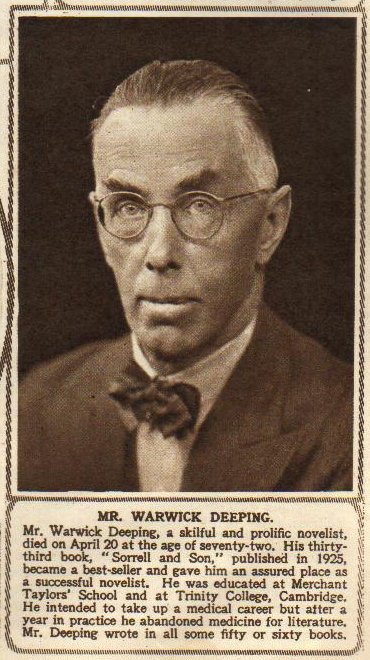 |
October:
Of a Lover's Quarrel and How it was Healed - 6 pages, in - The Argosy (UK short story
magazine), November 1927, Vol.11, No. 18 Thanks, Chris.
Old
Fagus *
Other Woman, The
Paternity
**
Poet and Peasant
Pool of the Satyr, The *
Precious Stones *
Rachel in Search of Reality
Red Blind, A
Red Van, The
Restitution
Ridicule **
Sand Dunes
Sand-pit, The |
Sappho
Sennen Climbs a Wall **
Shipwreck and a Shrew **
Six Months to Live ***
Son, The **
Stockings
Strange Case of Sybil Carberry, The ***
That Vulgar Person ***
Three Trees, The **
Tom Silver's Bus **
Two Men *
What About It? **
Wilmer's Wife |
From:
rainyday@bigpond.net.au (Rainy Day Books)
Very disappointing, Stories of love, courage and
compassion has the very same stories as The short stories
of Warwick Deeping. Might save someone else some money if
you make this clear. - Meryll Williams [Thanks, Meryll.]
# Stories of love, courage and compassion 1930
## Countess Glika and other stories
### The Argosy April 1932
#### The story-teller magazine ND cover missing
TT Two in a train and other stories
At "The Golden
Palace" #
Atlanta TT
Barron's Broken Head #
Bitter silence ##
Black Cat, The #
Blue Tulip, The #
Broken Violin, The ** #
Cakes and sherry TT
Caliban #
Cave, The #
Child, The #
Cocktails for two TT
Compassion TT
Contraband # Novelette
Discord #
Dr Morrow's patient TT
Elizabeth #
Encore, An TT
Escape #
Fame TT
First Wrinkle, The #
Francois TT
Girl on the mountain, The ##
Great Saaba Bridge. The * #
Gustave #
Harmless Satyr, The #
Heritage # |
Hesperides, The #
Immortals, The ** #
In a little Belgian town TT
In the Snow #
Jack and Andrew TT
Lady of the terrace, The ##
Laughing Sickness #
Liars, The #
Lucky ship TT
Madness of professor Pye, The TT
Malice of men, The TT
Man Who Came Back, The #
Man with the Red Tie, The #
Manners and men TT
Miss Telford's bed TT
Mr Verulam's week-end TT
Noise #
October: Of a Lover's Quarrel and How it was
Healed - 6 pages, in - The Argosy
Old Fagus * #
Old mischief TT
Other Woman, The #
Out of the sea TT
Paternity ** #
Poet and Peasant #
Pool of the Satyr, The * # Novelette ####
Precious Stones * # |
Rachel in Search of
Reality #
Rainbow, The TT
Red Blind, A #
Red shirt, The ##
Red Van, The #
Reprieve TT
Restitution #
Ridicule ** #
Sand Dunes # ###
Sand-pit, The #
Sappho #
Sennen Climbs a Wall ** #
Shipwreck and a Shrew ** #
Six Months to Live *** # Novelette
Son, The ** #
Stockings #
Strange Case of Sybil Carberry, The *** #
That Vulgar Person *** #
Three Trees, The ** #
Tom Silver's Bus ** #
Unexpected heir, The TT
Two in a train TT
Two Men * #
Waxwork show, A TT
What About It? ** #
Wilmer's Wife #
Wood, The TT |
From: Deeping Collector, July 2010
Back to Collecting
Books & Magazines INDEX page
|
bc |
